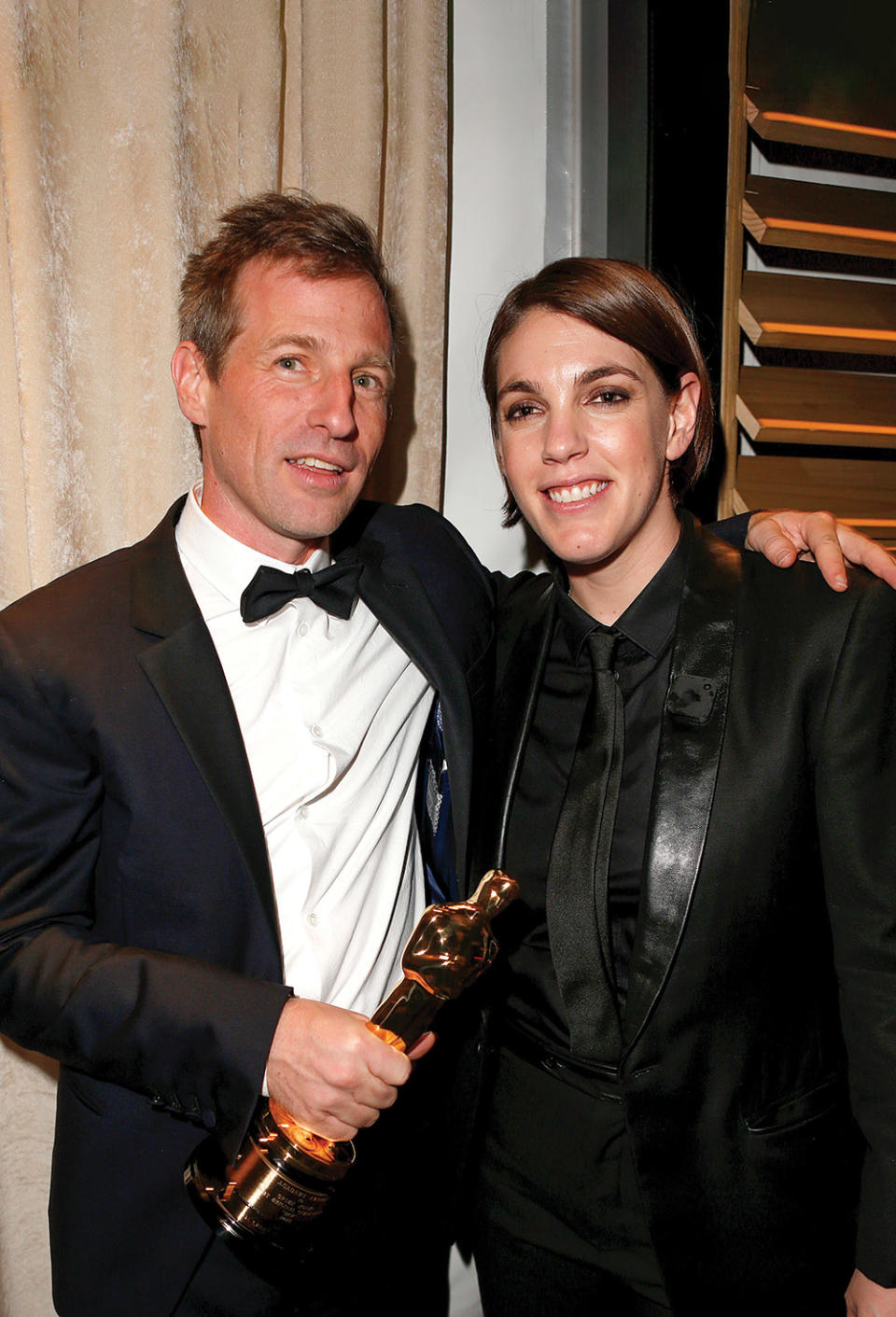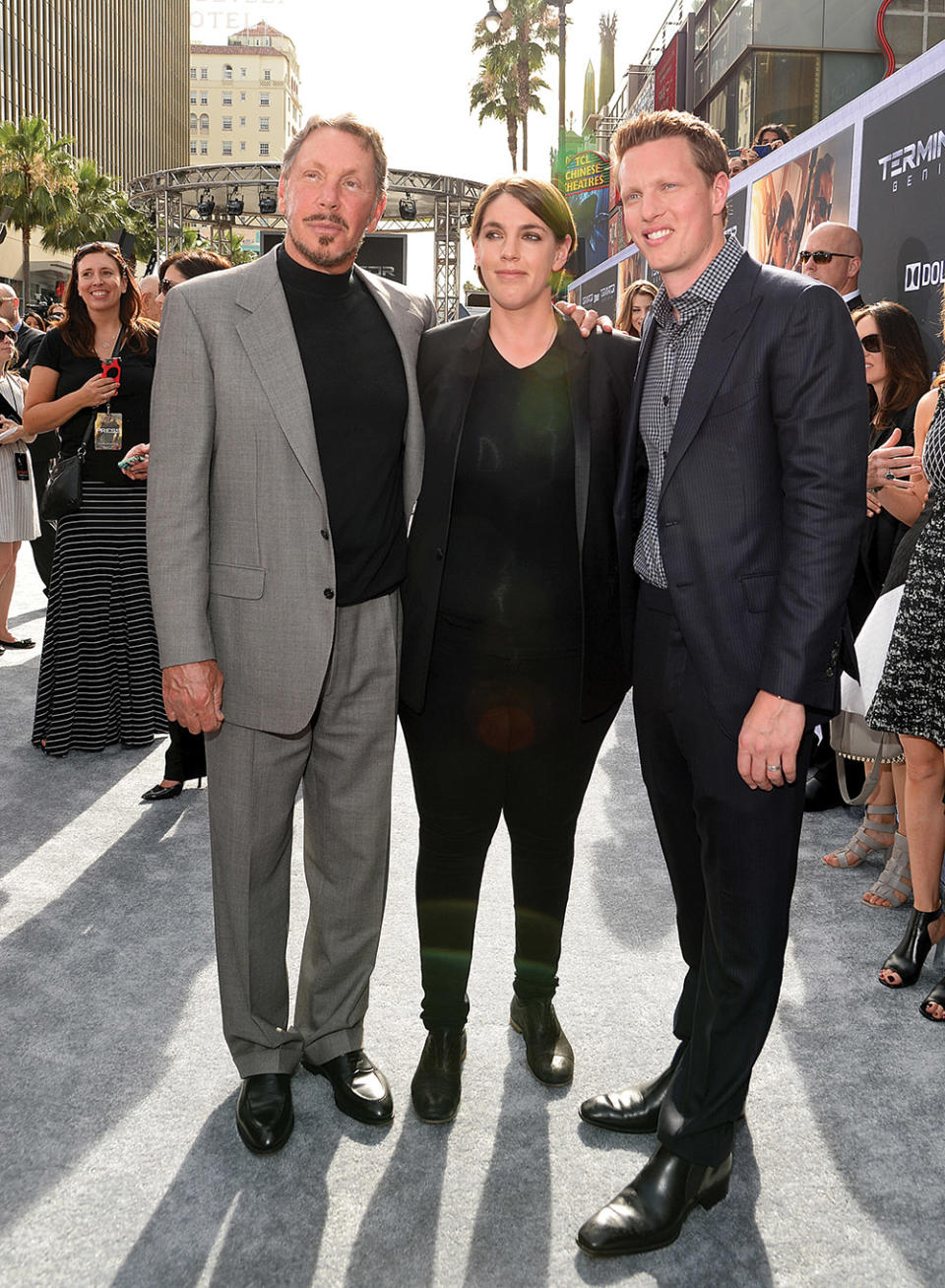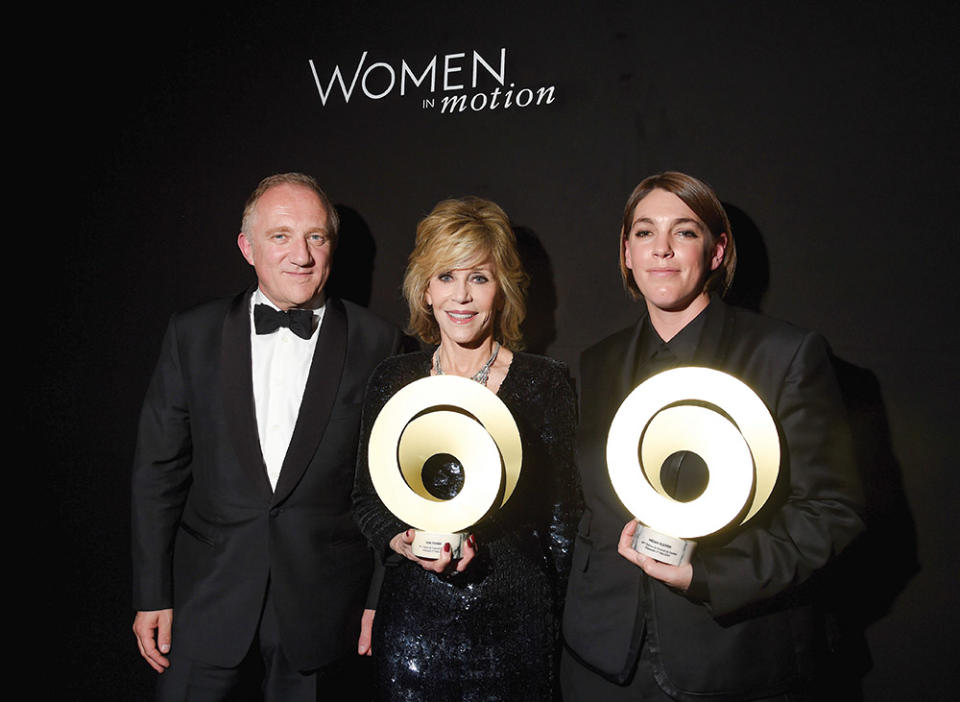The Second Coming of Megan Ellison

In early 2021, Megan Ellison emerged from a self-imposed Hollywood exile and did something she hadn’t done in over a year: She signed on to back a movie, Nimona. There was a time when this would not have been remarkable, when Ellison’s Annapurna Pictures was producing five films a year and she was considered the industry’s own Medici, the premier patron of prestige cinema. But Ellison had backed away from Hollywood in 2019 after a series of missteps and become elusive even to some of her own executives. When her former distribution chief, Erik Lomis, asked her whether she wanted to look at some reels of Nimona, which was about to get axed in Disney’s closure of Blue Sky Animation, “I wasn’t really engaging in new film projects at the time,” Ellison said, answering THR’s questions by email. “But being curious, I said yes.”
Ellison loved what she saw and paid a fee to purchase the project from Disney, then hired DNEG, the London-based VFX and animation company, to do the animation. “I needed this movie when I was a kid, and quite frankly, I needed it right then and there,” Ellison said. “It was the perfect story to come into my life at that moment.” While Disney had wanted to tone down the film’s LGBTQ+ characters before dropping the movie, Ellison, who is gay, encouraged filmmakers to embrace the qualities Disney hadn’t liked.
More from The Hollywood Reporter
Now, a decade after she became the first woman to receive two Academy Award best picture nominations in the same year at age 28 — for Spike Jonze’s Her and David O. Russell’s American Hustle — and four and a half years after she retreated from Hollywood, Ellison is back in the awards game, with Nimona nominated for the best animated feature Oscar.

Although Ellison faded from public view in 2019, her company has been quietly expanding into other media. Under Ellison as CEO, Annapurna, which is based in West Hollywood, is run by its former head of interactive, Nathan Gary, who is now president. The company has seen some of its biggest recent successes in the world of indie gaming, particularly with Stray, which sold multimillion units in its first month of release and won the gaming world equivalent of an Oscar in 2022. Annapurna has backed a string of hit TV shows like Hulu’s Pam & Tommy and HBO’s The Staircase, and its head of TV, Patrick Chu, recently made the rounds looking for new projects. Annapurna Theatre is behind productions like Appropriate, now on Broadway with Sarah Paulson and Elle Fanning, and the Sam Mendes-directed The Motive and the Cue, which is playing the West End. Ellison was active in meetings with the Nimona filmmakers in ways she hadn’t been on projects since before the pandemic, according to those who have worked with her. Even answering a few press questions about the film seemed like an unusual level of engagement for the taciturn producer.
But Ellison, who lives in London and L.A., has not been actively developing the kind of new projects that defined her career — mid-budget films by name filmmakers — and her departure from that space has left a void. (Recent Annapurna films are the product of deals struck years ago, such as the company’s long-gestating Amy Adams vehicle, Nightbitch, due out later this year from Searchlight and Hulu.) “There’s a lot of phenomenal, important movies that Annapurna made in the $20 to $50 million range,” says Mark Boal, who wrote and produced the Ellison-backed films Zero Dark Thirty and Detroit. “That is a very filmmaker-driven space. Over the past 10 years, that space has gotten pretty barren.”
Ellison’s withdrawal from filmmaking left many with whom she had worked bewildered. “She had such a big spotlight on her for a while, and she receded, and only she knows why,” says one industry source. “Everybody hopes she gets back in the game. It comes down to: Does she still have money to make things?”
***
The daughter of Oracle founder Larry Ellison and younger sibling of Skydance Media CEO David Ellison, Megan Ellison, now 38, has always been shy and press-averse. (Though Ellison answered questions about Nimona over email, she otherwise declined to go on the record.) David and Megan’s mother, Barbara Boothe, divorced Larry when Megan was a baby, and Barbara raised her kids to be movie lovers, watching films together from a giant VHS collection. As children, they vacationed with their dad, and as adults, they travel to Lanai, the Hawaiian island Larry bought in 2012. Both children inherited trusts, and Larry — whom Forbes pegs with a net worth of $142 billion — made investments in each of their companies. David, the first Ellison to arrive in Hollywood and defy the town’s dumb-money expectations, set his sights on tentpole movies, including World War Z. Skydance backed the blockbuster Top Gun: Maverick and the Mission: Impossible films and, according to some reports, the company is currently exploring acquiring Paramount.

Megan’s first film credit was as a boom operator on a short film David wrote and directed when she was 19. Her interests were always driven more by art than commerce, and she began financing low-budget movies in her early 20s. At 23, she helped fund the Coen brothers’ True Grit and began working with CAA’s film finance group. She founded Annapurna in 2011 at age 24. Within a few years, Ellison was doing the things movie moguls do, attending awards shows in a custom tuxedo, getting feted at Cannes. Crucially, she had something Hollywood knew she hadn’t bought: taste. She backed daring projects like Kathryn Bigelow’s Zero Dark Thirty, Paul Thomas Anderson’s Phantom Thread and Mike Mills’ 20th Century Women, films that would have been impossible to finance in Hollywood’s franchise-driven era without someone like Ellison shouldering some of the budget. “She talks like a filmmaker,” says one who has worked with Ellison in the past. “She gets it and she encourages them to take risks. She’s trusting and supportive. She does the things studio heads used to do before this place turned into a corporate shitshow.”

Ellison’s retreat from the business in 2019 followed a tumultuous stretch at Annapurna, as she tried to expand the company into the area of theatrical distribution. Not yet 30, and with zero management experience, Ellison attempted too much too soon and failed. In 2017, Annapurna launched its distribution arm, known as United Artists Releasing, a joint venture with MGM. “She was tired of being told when the release date would be,” says one former Annapurna employee of the decision to start distributing films. The first film UAR distributed was Detroit, an awards contender that got a late summer 2017 wide release, grossing $7 million in its opening weekend then falling from there. UAR would rerelease the movie in December to assist with a potential awards run, ultimately grossing $24.1 million worldwide off a production budget of $34 million. A year later, two Annapurna titles, Adam McKay’s Vice and the Nicole Kidman-fronted The Destroyer, released on Christmas Day, with Vice earning $70.9 million worldwide against a budget of $60 million and Destroyer earning $5.9 million worldwide against a budget of $9 million.
When Annapurna’s finances took a hit from the distribution expenses, Larry Ellison brought in one of his associates to advise on belt-tightening. No longer a savior of filmmakers, Annapurna became a deserter of them. In 2018, the company dropped the Charlize Theron starrer Bombshell just two weeks before the start of production, leaving producers scrambling for new financing, and let go of the Jennifer Lopez stripper crime drama Hustlers.
Ellison always had been an inconsistent communicator, which drove some of her business partners crazy. “Hollywood has a culture that is very clubby,” says a filmmaker who has worked with Ellison. “And Megan did not follow the rhythms of the business. She didn’t always return phone calls on time. She didn’t go to every single party that was expected of her. She didn’t follow the quote-unquote ‘way things were done.’ Maybe she didn’t return your phone call, but she financed your client’s crazy movie. Isn’t that more important? In Hollywood, it’s not.”
Internally, Ellison was arguing with her team about decisions on marketing and budgets. “She didn’t like bad news,” says one former Annapurna employee. Ellison’s team was fiercely loyal to her, but the shouting matches were taking a toll. At one meeting, she flung a patio chair at a wall out of frustration. Then she’d be impossible to get hold of. “Her thing is, she’ll be really in and intense and then vanish,” says a former Annapurna employee. Says another person who has worked with Ellison, “She can be erratic, but welcome to Hollywood.”
Once Annapurna started jettisoning projects, the goodwill Ellison had earned began to erode. Then in late 2019, she went to Lanai and stayed for much of 2020 due to the pandemic. Ellison’s absence, even on calls and Zooms, left her loyalists adrift. “You start asking yourself, ‘Why am I doing this for someone I don’t see very often?’ ” says one former Annapurna employee. Christina Oh and Adam Paulsen, who joined Annapurna to head its film division in 2021, left (Oh is now running Steven Yeun’s new shingle, having worked with the actor on the Oscar winner Minari). One of the company’s TV executives, Ali Krug, is gone, and its head of physical production, David Wolkis, stayed just a year before moving to Skydance in 2022. HBO veteran Sue Naegle, who had been at Annapurna since 2016 and risen to chief content officer, also departed the company in 2022.
Ellison is now heading the film division herself, and former Annapurna executive and producer Stephen Feder, whose credits include the Richard Linklater movie Everybody Wants Some!!, has been acting as a consultant. Now, after years of inactivity making movies, and a steady stream of executive departures, much of the entertainment industry has written off Annapurna as a meaningful player. “They are a nonentity,” quips a top talent agent. Annapurna is still in the business of financing production on feature films, the company says, but agency sources say they have seen little evidence of that in recent dealmaking. No other company has been able to fill that mid-budget space — recently, production-financier Bron has tried but ended up financially battered and bruised.
***
There is one space that has recently proved lucrative for Annapurna: video games. The company is in the black in great part thanks to Annapurna Interactive, co-founded by Gary. The exec came out of Sony Interactive’s Santa Monica Studio operation with credits that include the popular God of War and Twisted Metal games. Gary started the division in 2016 to publish creator-centric games, and he splits his time between the company’s West Hollywood headquarters and his home in Hawaii (Kona, on the Big Island). Annapurna Interactive now produces four to five games annually.
In the same way that mid-budget films have become untenable in the current market due to increased production costs and marketing spends, mid-budget games have been affected by the economics of entertainment media. Annapurna has found a niche providing financial backing to develop and publish low-to mid-budget games from auteur creatives. While Activision Blizzard and Sony dole out hundreds of millions for blockbuster hits touted in quarterly earnings calls, Annapurna Interactive games are independent, seen as narratively focused and stylistically distinct. But where low- to mid-budget films proved costly for the company, Annapurna’s gaming counterparts have been a boon.
“Annapurna [Interactive] would probably want to be compared to Annapurna Pictures, and I do think some of the spirit is engrained in it, but I would say it’s more akin to A24,” explains Brandon Winfrey, a game industry vet and current instructor in the game division at the New York Film Academy. “You know what you are getting with an A24 movie artistically, which is separate from the mainstream. That is what gamers know when an Annapurna game is coming out.”
One of the company’s biggest successes is Stray, an action game that follows a cat as it makes its way through a neon-hued city filled with robots and mutant bacteria. At the 2022 Game Awards, Stray was nominated for best game of the year and won independent game. Another game, Hindsight, takes the player into the memories of a woman who had a complicated relationship with her dead mother.
As a sign of its new focus, Gary was named president of Annapurna Pictures in 2021, overseeing the entire company’s operations. His leadership style alienated some of Ellison’s Hollywood staffers. Since then, as executives entered and exited film and TV operations, the interactive division has only grown. In 2022, Annapurna announced it would start its own internal game production studio, controlling the design and physical production of the games, and in 2023, the company acquired South African game studio 24 Bit Games, further expanding its capabilities.
Last summer, Annapurna revealed the first game it’s developing in-house, which will also be its splashiest and is based on existing Hollywood IP. Blade Runner 2033: Labyrinth will be the first new Blade Runner game for consoles and PC in 25 years. Even as the division scales up, Annapurna Interactive is not likely to meet the same fate that Annapurna Pictures did. Says Winfrey, “[Unlike films,] you aren’t paying [for a cast of] A-list stars, so you aren’t blowing out that budget. Even if these projects take five years to develop, with 10 to 20 people on board, it is still contained.”
There are hints of the old Ellison in the making of Nimona, the one who earned so much filmmaker loyalty. “I backed the film because it wasn’t going to happen otherwise,” she said. “Everyone else who could support a film of this size had passed. I heard Netflix was interested but they needed a partner on it, and that’s where Annapurna came in.”
Nick Bruno, who directed Nimona with Troy Quane, says: “Megan was open. It didn’t feel like she was going to rule with an iron fist.” When the filmmakers started to worry about a dialogue-free section of the third act that dealt with suicide and considered adding jokes, “She said, ‘Guys, trust yourselves here,’ ” Quane recalls. “She was a very calming influence.” (They left out the jokes.) The animation division now employs 11 people and is at work on projects including a Stray feature adaptation and a TV series based on Sausage Party, the 2016 R-rated animated comedy Ellison produced with Seth Rogen’s Point Grey Pictures.
If Nimona’s success does tempt Ellison back into filmmaking, agents may not be the ones rolling out the welcome mat. Says one top filmmaker rep whose clients have worked with Annapurna in the past: “No chance would I let my filmmakers be the first ones back in there.” Filmmakers, however, may be more forgiving. “She’s one of a kind in terms of her taste and her courage to put capital behind interesting ideas,” says a filmmaker who has worked with Ellison. “She has more guts than most of the town’s agents and executives put together.”
***
Megan’s Latest
Launched as a film company in 2011, Annapurna now deals in TV, theater, games and animation.
Appropriate (2023)
Annapurna Theatre, formed in 2019, has backed plays and musicals including this family drama, currently on Broadway with Sarah Paulson and Elle Fanning.
Stray (2022)
The company’s narrative-driven games, like this award winner about a cat, have become a source of revenue and IP for other divisions.
The Staircase (2022)
The HBO miniseries, which earned Emmy noms for Colin Firth and Toni Collette, is part of a TV slate that also includes Hulu’s Pam & Tommy and Amazon’s Dead Ringers.
She Said (2022)
Annapurna has become much less of a player in prestige live-action films, but it backed this Universal drama about the reporters who exposed Harvey Weinstein.
Nimona (2023)
When Ellison picked up this Disney cast-off and partnered with Netflix, the movie got an Oscar nomination and she launched Annapurna Animation.
This story first appeared in the March 6 issue of The Hollywood Reporter magazine. Click here to subscribe.
Best of The Hollywood Reporter
